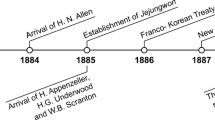Abstract
An antiseptic religion is a form of Protestant Christianity that was shaped in the context of colonization in Korea. This term was coined to explain a religious hybrid that was produced by the intermingling of American Evangelical Protestant Christianity, the concept of hygiene (germ theory) and indigenous Korean religiosity. This research deals with a historical process of making ‘a medicalized religion’ in Asia from a perspective of postcolonialism. Most of the early American Protestant missionaries in Korea were medical doctors who were influenced by the Germ theory of illness and considered Western medicine as an efficient tool to evangelize the country. As a result of their mission, a religious culture which emphasized washing away sins from the soul as analogous to washing away germs from the body was born. In addition, the Korean people developed a very unique form of public bathing ritual centered in the development of public baths to alleviate anxiety and to destabilize the solid strategies of the Japanese and the Americans, the two major colonial powers in Korea’s history in the late 19th century.
Similar content being viewed by others
References
Texts in English
Allen, H. N. (1908). Things Korean. New York: Fleming H. Revell Company.
Avison, O. R. (1980). Cholera in Seoul. The Korean Repository (reprint). Seoul: RAS.
Avison, O. R. (1999) Some High Spots in Medical Mission Work in Korea I. The Korea Mission Field (reprint). Seoul: The Federal Council of Protestant Mission in Korea.
Foucault, M. (1981). Omnes et Simulatim. The Tanner Lecture on Human Values. Salt Lake City: University of Utah Press.
Foucault, M. (1994). The birth of the clinic: An archaeology of medical perception (Vintage ed.). New York: Vintage Books.
Foucault, M. (1995). Discipline and punish: The birth of the prison (2nd Vintage ed.). New York: Vintage Books.
Foucault, M. (2003). Society must be defended. New York: Picador.
Freud, S. (1981). Obsessions and religion. In J. Strachey (Ed.). The complete psychological works of Sigmund Freud (Vol. IX). London: The Hogarth Press.
H.I.J.M.’s Residency General. (1908). Annual report for 1907 on reforms and progress in Korea. Seoul: H.I.J.M.’s Residency General.
Prothero, S. (2001). Purified by fire. Berkeley: University of California Press.
Ricoeur, P. (1967). The symbolism of evil. New York: Harper & Row Publishers.
Tomes, N. (1998). The gospel of germs. Cambridge: Harvard University Press.
Underwood, L. (1904). Fifteen years among the Top-Knots. New York: American Tract Society.
Texts in Korean
Ko, M.-S. (2001). 한국 근대성의 기원을 찾아서 [Finding the Origin of Korean Modernity]. Seoul: Checksesang.
Lee, D.-J. (2006). 한국 교회 처음 이야기 [Stories of the Early Korean Church]. Seoul: HongSungSa.
Takekuni, T. (2006). 한국 온천 이야기 [A Story of Korean Hot Spring; Kankoku Onsen Monogatary]. Seoul: NonHyung.
Author information
Authors and Affiliations
Corresponding author
Rights and permissions
About this article
Cite this article
Kim, S.K. An Antiseptic Religion: Discovering A Hybridity on the Flux of Hygiene and Christianity. J Relig Health 47, 253–262 (2008). https://doi.org/10.1007/s10943-008-9172-3
Received:
Accepted:
Published:
Issue Date:
DOI: https://doi.org/10.1007/s10943-008-9172-3



